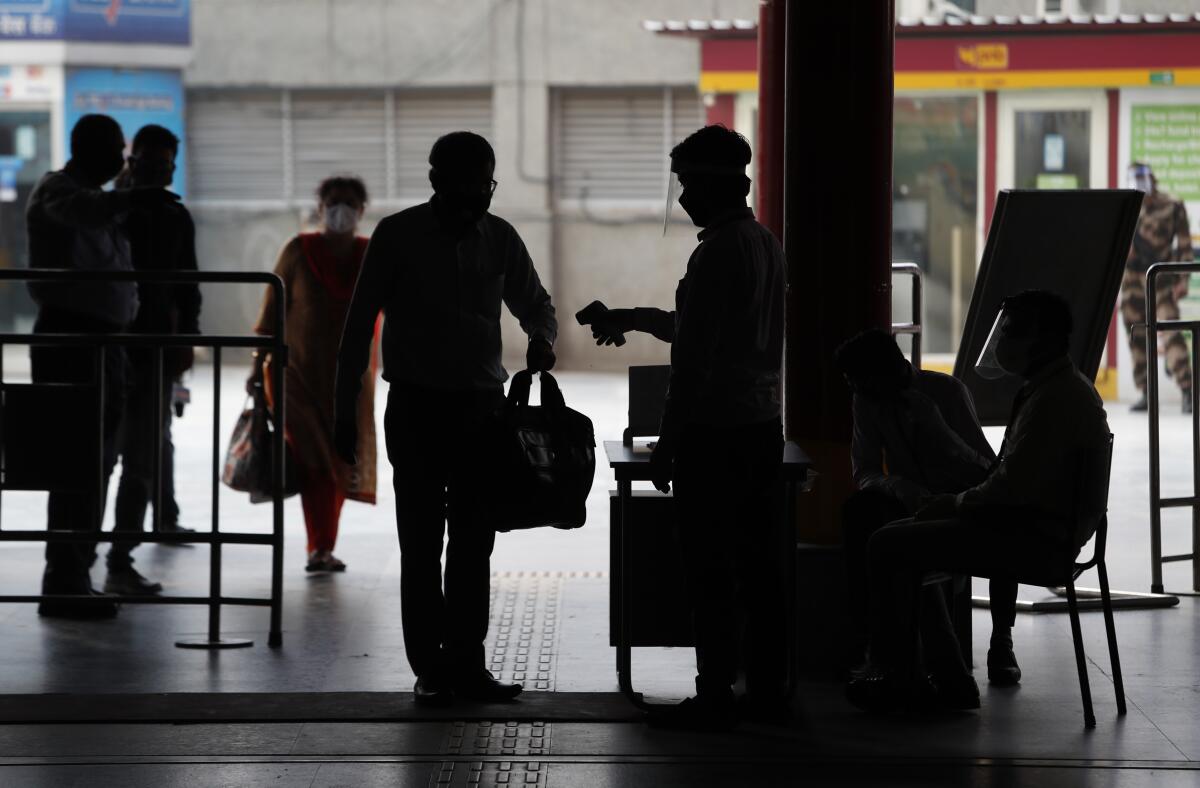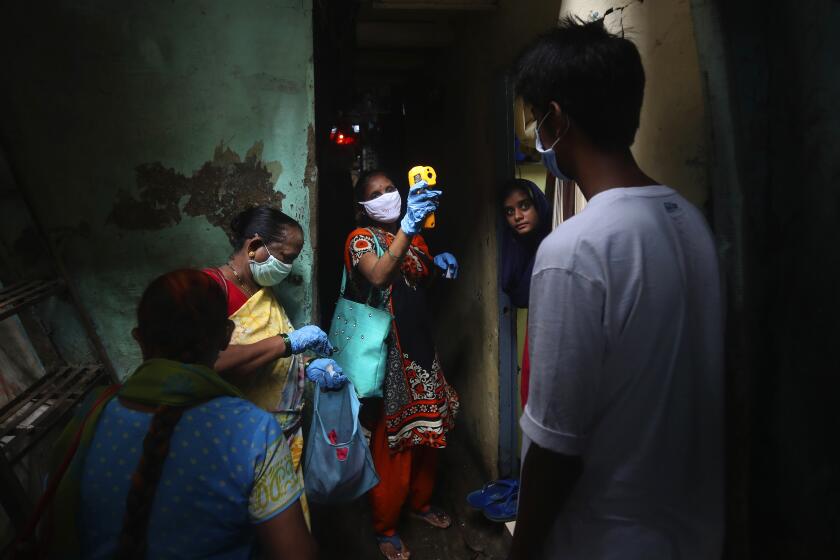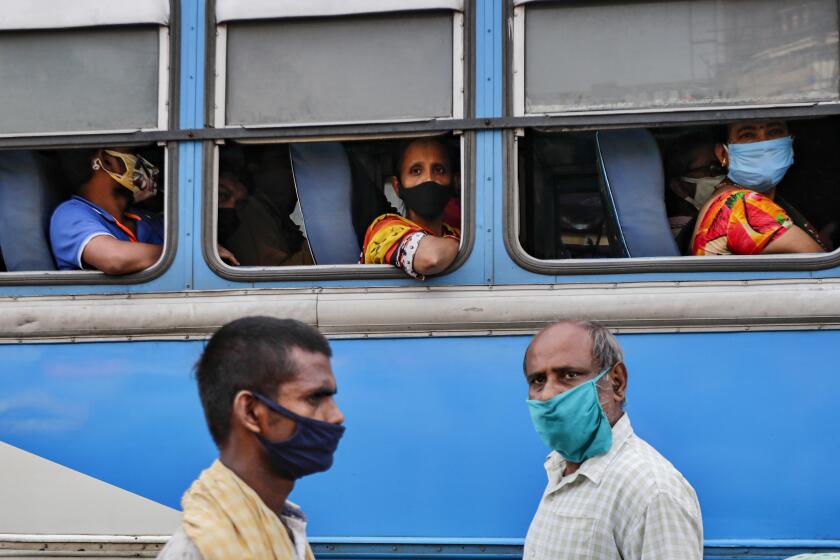Suicides rise after coronavirus puts squeeze on India’s middle class

- Share via
NEW DELHI — Manu and Jeena started working at one of India’s top IT companies on the same day two years ago, brimming with enthusiasm as they embarked on their careers.
But as the months went by, Manu watched Jeena, a kind woman in her mid-20s with striking almond-shaped eyes, growing increasingly stressed at work.
The coronavirus pandemic only intensified the pressure: their monthly salary of about $230 was cut by 11%, while some employees were “benched” with no work.
In May, after not working for weeks, Jeena committed suicide.
“She died in despair over losing her job,” said her brother in the police report.
The company in Kochi denies she was laid off or that her salary was cut.
“It’s very shocking for me. She was a good friend and colleague and like my sister,” said Manu, who asked to use a pseudonym over fear of repercussions. “I can’t accept that she is no longer here. I think about her every day.”
The 27-year-old said he wanted to resign from the company but, like Jeena, he bears the middle-class burden of loans as well as supporting his family. After paying his rent and $135 in loans, Manu is left with just $11 for monthly expenses.
“We are all facing family issues and debt,” he said. “It is terrible.”
Even before COVID-19 hit, white-collar workers were under immense pressure as India’s growth stalled. Suicides among professionals have climbed for two consecutive years, averaging 23 a day in 2019, according to the National Crime Records Bureau.
A study of 660,000 Indians finds that a few individuals spread most new infections and that children transmit the coronavirus just as well as adults.
“It’s the uncertainty that causes the maximum distress,” said Lakshmi Vijayakumar, a psychiatrist and suicide expert in Chennai, who added that the pandemic had led to significantly more suicides among professionals.
“They are burnt out and Zoomed out,” she said. “There is the fear of infection and financial insecurity.”
The pandemic has compounded India’s economic challenges, with millions losing their jobs. The country’s economic output shrank by 24% in the three months to June compared with the same period last year, the steepest fall among the world’s largest economies.
While casual laborers are beginning to pick up more work, middle-class professionals are still struggling.
The Centre for Monitoring the Indian Economy (CMIE), a think-tank, reported that 6.6 million white-collar jobs — including those held by engineers, physicians and teachers — were lost between May and August 2020, the steepest fall among salaried workers.
Efforts to revive the economy have been thwarted by rising numbers of infections. With more than 6.6 million confirmed coronavirus cases, India is expected to surpass the U.S. soon as the country with the highest number of infections.
“There is fear and widespread panic,” said Shamika Ravi, economist at Brookings Institution in New Delhi. “The entire Indian economy is in the petrified zone.”
As the coronavirus cases continued to climb through the summer, so did white-collar job cuts.
Vinod AJ lost his job in August as a software engineer earning about $1,219 a month with Cognizant.
“The fear factor is everywhere,” said Vinod, speaking from Chennai, where he lives with his wife and 2-year-old daughter.
Journalists covering India’s rapidly growing COVID-19 epidemic are facing criminal charges, police harassment and restrictions on information.
For 13 years, he has sent money back to his family in the town of Kanyakumari, where his parents worked as teachers and his grandparents were rice farmers.
Desperation is rising among employees, many of whom were the first generation to go to university and still support families living in rural areas, said Vinod, who also works as general secretary for All India Forum for IT Employees.
“These mass lay-offs are putting fear into junior employees. We are wondering how prosperity and jobs will pick up again,” Vinod said.
Coronavirus laid bare the deep structural problems in India’s economy. For years there have not been enough jobs for the more than 10 million graduates who enter India’s workforce annually. Prime Minister Narendra Modi’s vaunted “Make in India” initiative, designed to boost manufacturing jobs, has failed to take off.
Despite earning top degrees in business administration or engineering, many graduates have been forced to shelve their aspirations and take jobs working as drivers for Uber or food delivery companies.
The youth are particularly hard hit.
“This is a matter of serious concern,” said Mahesh Vyas, chief executive of the CMIE.
“Having cleared their exams and found a job, they’ve lost it all,” he said. “It could be three cohorts of graduates competing for very few jobs two years down the line.”
The blow to the middle class, India’s growth engine, is sharply weakening demand and complicating the country’s economic recovery. Reflecting the collapse in consumption, India reported a record-high current account surplus of $19.8 billion in the second quarter as merchandise imports plummeted.
But the crisis was also an opportunity to enact deep reforms, said Nguyen Trinh, economist at Natixis in Hong Kong.
“The middle class barely got developed in the first place,” she said. “The question is what is Modi going to do about it?”
Modi’s second term, however, has been dominated by a divisive political agenda. His ruling Bharatiya Janata party pushed through agricultural reforms last month, but with suppressed demand, the prospects of winning job-generating investments are slim.
Manu, meanwhile, is hoping to find work at a different company.
“I’m ready to do any job, it doesn’t have to be white-collar,” he said. “My dream is to own a house. But this situation is pathetic.”
Additional reporting by Jyotsna Singh.
© The Financial Times Ltd. 2020. All rights reserved. FT and Financial Times are trademarks of the Financial Times Ltd. Not to be redistributed, copied or modified in any way.
NOTE: If you or someone you know is exhibiting warning signs of suicide, seek help from a professional and call the National Suicide Prevention Lifeline at 1-800-273-TALK (8255).
More to Read
Sign up for Essential California
The most important California stories and recommendations in your inbox every morning.
You may occasionally receive promotional content from the Los Angeles Times.















